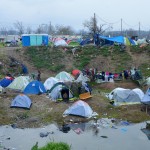Normal Rules No Longer Apply?
The always thoughtful David Brooks has a chilling column in the New York Times today questioning whether a convention win will translate into a November win for the Democrats at the polls. At first glance, maybe it will.
He argues that Donald Trump has — if unintentionally — stumbled on an ingenious way to to allow the Democrats to save themselves: by “abandoning the great patriotic themes that used to fire up the GOP… he’s allowed the Democrats to seize that ground.”
“Trump has abandoned the deep and pervasive optimism that has always energized the American nation,” he says. He adds: “Democrats have often been ambivalent about that ardent nationalistic voice, but this week they were happy to accept Trump’s unintentional gift.”
But he fears that although “the Democratic speakers hit doubles, triples and home runs… the normal rules may no longer apply.”
He adds: “It could be in that in this moment of fear, cynicism, anxiety and extreme pessimism, many voters have decided that civility is a surrender to a rigged system, that optimism is the opiate of the idiots and that humility and gentleness are simply surrendering to the butchers of ISIS. If that’s the case then the throes of a completely new birth are upon us and Trump is a man of the future.”
Paul Krugman — also in the NYT today — poses the question, “Who Loves America?” And makes this telling observation: “If what bothers you about America is, instead, the fact that it doesn’t look exactly the way it did in the past (or the way you imagine it looked in the past), then you don’t love your country — you care only about your tribe.”
Trump and Russia
Having myself written this week for The Hill about Trump and Russia, I think this point from Krugman is thought-provoking: “Mr. Trump’s willingness to cast aside our nation’s hard-earned reputation as a reliable ally is remarkable. So is the odd specificity of his support for Mr. Putin’s priorities, which is in stark contrast with the vagueness of everything else he has said about policy. And he has offered only evasive non-answers to questions about his business ties to Putin-linked oligarchs.”
The Trump-Russia links are fascinating. As I pointed out earlier this week, if those business ties and financial dealings, as well as the relationships some of his advisers have had with Kremlin-run entities and allies, had been ones pursued by Clinton or her advisers, American Conservatives would be in uproar and hurling the national-security card.
Does that mean I think Trump is a recruited Russian agent? No, there is no basis for making such an allegation. But the question remains — and Trump and his advisers have not answered it — how much do those ties and connections go to shape and mould his foreign-policy thinking, or their’s, when it comes to Russia? Is Trump being reflexively a business deal-maker and playing nice now to Putin in the hopes that post-election, if he fails to win the presidency, he will be rewarded with the kind of deals in Russia that have so far eluded him?
There is something truly shocking, even tawdry, observing national-security Republicans remaining mainly silent on all of this.
On a side-note, it is curious to see Wikileaks and Edward Snowden fall out over the right approach to leaks with the NSA whistleblower condemning in a Tweet Wikileaks “hostility to even modest curation.” Predictably, Wikileaks has accused Snowden of pandering to the Democrats.
Of course, Wikileaks never panders to anyone, does it? The Wikileaks site is full of embarrassing Russian data disclosures, isn’t it?







































